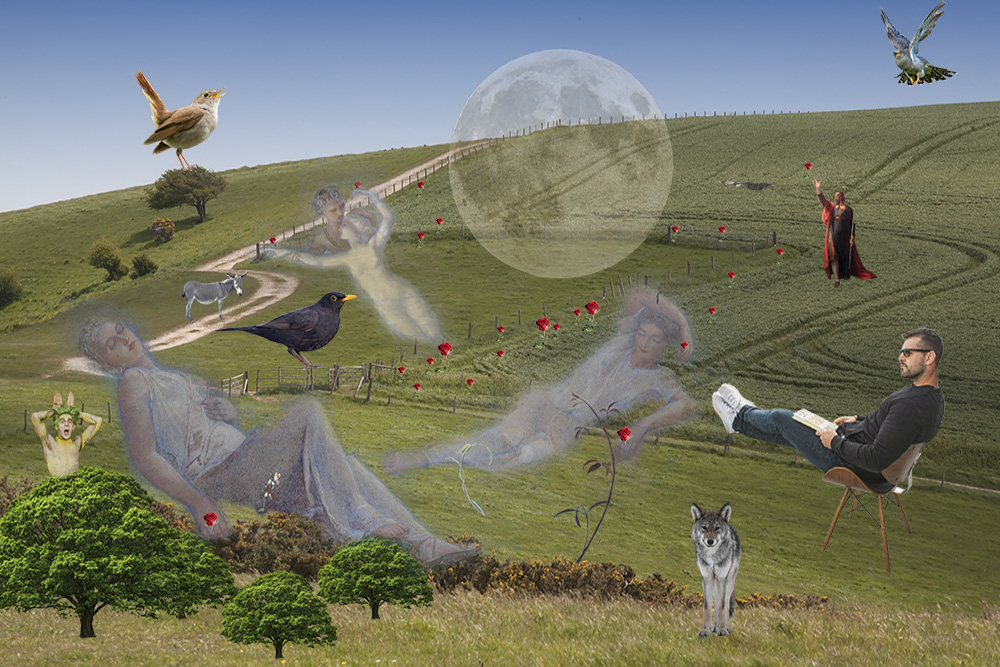Reality is neither tidy nor efficient, nor does it comfortably tolerate fences and fields. The real world is composed of astonishing patterns of complexity which shade and grade into one another in endless and random configurations
– Joseph Meeker, Fields of Danger and the Wilderness of Wisdom
The wolf behowls the moon
– A Midsummer Night’s Dream
The genres of Tragedy and Comedy are more than literary. According to ecologist Joseph Meeker, they are modes of being where Tragedy “assumes that man exists in a state of conflict with powers that are greater than he is.” Comedy however “grows from the biological circumstances of life. ” The first is existential and cerebral, but the second is grounded (The Comedy of Survival, 1974).*
Meeker says “comedy imitates the actions of men who are sub-normal or inferior to the social norm and tragedy imitates the actions of superior men.” This is not a comfortable analysis for 2025 with its higher and lower value. It can however be recognised in Shakespeare, comparing for example Caliban with Prospero. Caliban is the lowly son of the sea witch Sycorax.
The story shouldn’t be ripped from context and today projected onto the past. There is however a validity in Caliban’s claim to where he lives and the knowledge he has: “I’ll show thee every fertile inch o’ th’ island.”
Western Civilization is founded on the tragic mode tracing back to Sophocles, Euripides, and Aeschylus. It means a view of nature which is exploitative and uncaring. Comedy however:
Is not a philosophy of despair or pessimism, but one which permits people to respond with health and clear vision despite the miseries the world has to offer. Its mode is immediacy of attention, adaptation to rapidly changing circumstances, joy in small things, the avoidance of pain wherever possible, the love of life and kinship with all its parts, the sharpening of intelligence, complexity of thought and action, and strategic responsiveness to novel situations. It permits people to accept themselves and the world as they are, and it helps us make the best of the messes around us and within us (Meeker)
This is not entirely accurate because the tragic mode is partially correct. We do live with powers greater than us including the fact of mortality, which for Buddhist philosophy is the basis of existence. We are born into suffering because life is impermanent. Conflicting with greater powers is not the same as acknowledging them. Meeker’s comic philosophy resolves the problem.
What interests me for Conceptual Art is this recognition of nature and the deeper significance of play. If you laugh at something, it doesn’t trap you, as if not taking things seriously is a background permanent truth.
These themes of tragedy and comedy are in Shakespeare. Thus Hamlet, Macbeth and Lear are serious, but it is Lear’s Fool who has the wisdom. A Midsummer Night’s Dream mocks the failing of love when we are fooled by outer appearance. All it needs is a little magic, and a donkey becomes attractive.
Shakespeare understood the corrupt mechanisms of the court and retreating into nature, a forest or otherwise, restores balance. Comedy is the greater mode, and aligns with Conceptual Art. Not the seriousness of the obvious, but a creative blend where fact meets fiction as boundaries dissolve.
I had a curious dream, where I was discussing a book. This is how Into the Garden began. A man said to me “it leads straight into the garden.” He meant the space was the same, no difference between book and geography. With the logic of a dream, I translate this into South Downs art with a play about sophisticated comedy.
* This is relevant for Mary Oliver’s poem Wild Geese.

